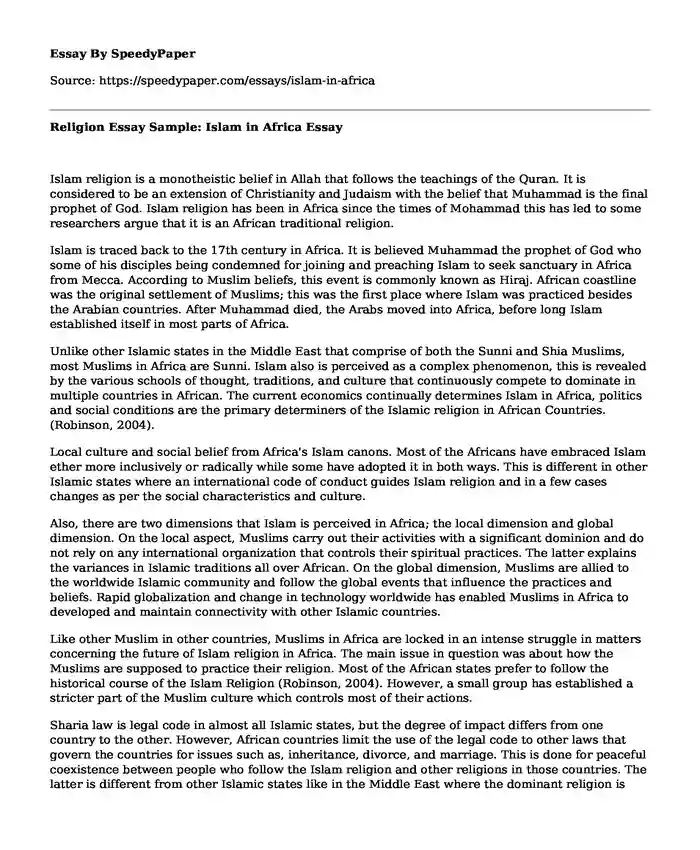Islam religion is a monotheistic belief in Allah that follows the teachings of the Quran. It is considered to be an extension of Christianity and Judaism with the belief that Muhammad is the final prophet of God. Islam religion has been in Africa since the times of Mohammad this has led to some researchers argue that it is an African traditional religion.
Islam is traced back to the 17th century in Africa. It is believed Muhammad the prophet of God who some of his disciples being condemned for joining and preaching Islam to seek sanctuary in Africa from Mecca. According to Muslim beliefs, this event is commonly known as Hiraj. African coastline was the original settlement of Muslims; this was the first place where Islam was practiced besides the Arabian countries. After Muhammad died, the Arabs moved into Africa, before long Islam established itself in most parts of Africa.
Unlike other Islamic states in the Middle East that comprise of both the Sunni and Shia Muslims, most Muslims in Africa are Sunni. Islam also is perceived as a complex phenomenon, this is revealed by the various schools of thought, traditions, and culture that continuously compete to dominate in multiple countries in African. The current economics continually determines Islam in Africa, politics and social conditions are the primary determiners of the Islamic religion in African Countries. (Robinson, 2004).
Local culture and social belief from Africa's Islam canons. Most of the Africans have embraced Islam ether more inclusively or radically while some have adopted it in both ways. This is different in other Islamic states where an international code of conduct guides Islam religion and in a few cases changes as per the social characteristics and culture.
Also, there are two dimensions that Islam is perceived in Africa; the local dimension and global dimension. On the local aspect, Muslims carry out their activities with a significant dominion and do not rely on any international organization that controls their spiritual practices. The latter explains the variances in Islamic traditions all over African. On the global dimension, Muslims are allied to the worldwide Islamic community and follow the global events that influence the practices and beliefs. Rapid globalization and change in technology worldwide has enabled Muslims in Africa to developed and maintain connectivity with other Islamic countries.
Like other Muslim in other countries, Muslims in Africa are locked in an intense struggle in matters concerning the future of Islam religion in Africa. The main issue in question was about how the Muslims are supposed to practice their religion. Most of the African states prefer to follow the historical course of the Islam Religion (Robinson, 2004). However, a small group has established a stricter part of the Muslim culture which controls most of their actions.
Sharia law is legal code in almost all Islamic states, but the degree of impact differs from one country to the other. However, African countries limit the use of the legal code to other laws that govern the countries for issues such as, inheritance, divorce, and marriage. This is done for peaceful coexistence between people who follow the Islam religion and other religions in those countries. The latter is different from other Islamic states like in the Middle East where the dominant religion is Islam the Sharia law is strictly followed.
Sufism is a Muslim belief that emphases on the spiritual essentials of Islam religion and it has many guidelines as well as believers in West Africa and Sudan. Sunni Muslims from Africa are syncretic as most of them exercise Sufism with out-dated African folklore culture. Salafists disapprove the folklorists Sufis, and they believe they are fusing un-Islamic views in their worshipping of Allah.
Recently, Salafism has begun making its way into Africa this is due to the help of Non-Governmental Organizations (NGOs) such as the World Assembly for Muslim Youth, World Muslim League, and the Federation of Mab and Islamic Schools primarily backed by Salafi regime. These organizations are believed to be funded by Nations whose aim is to form reforms aimed at regarding Sufism as a different interpretation of Islam (Robinson, 2004). They attain this through the construction of mosques in Africa.
There was the considerable resistance of the Islam religion by the majority of people living in African countries since they have a smaller percentage compared to other religions. The hostility was because conversion was a self-initiative act that leads to detribalization and incorporation into the Muslim community and going against the socially tolerable community lifestyle. This is the opposite case in other Islamic states like in the Middle East where the dominant religion is Islam.
In conclusion, Islam in Africa is not the same as Islam in other parts of the world because aspects of Islam like Sharia Laws is not as dominant as in other parts of the world. Moreover, Islam in Africa is much more influenced by local culture unlike the rest of the world, especially the Middle East where Arabic culture takes center stage in how Islam is practiced.
References
Robinson, D. (2004). Muslim societies in African history (Vol. 2). Cambridge University Press.
Cite this page
Religion Essay Sample: Islam in Africa. (2022, Apr 14). Retrieved from https://speedypaper.com/essays/islam-in-africa
Request Removal
If you are the original author of this essay and no longer wish to have it published on the SpeedyPaper website, please click below to request its removal:
- The Han Dynasty Empire, Free Essay Example
- Free Paper Example with Middle Manager's Incentive Plan
- Acting on Emotions, Free Essay for Everyone
- The Relationship Between the Government and the Media, Essay Example
- Essay Example: Cross-Cultural Marriages
- Literature Review and Essay
- Cirrhosis of the Liver and Alcoholism
Popular categories





